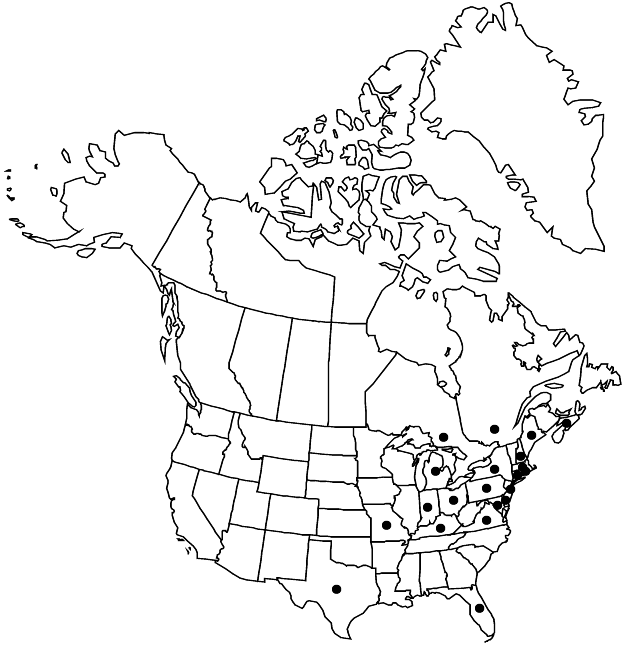Difference between revisions of "Persicaria robustior"
Bull. Torrey Bot. Club 36: 455. 1909.
FNA>Volume Importer |
FNA>Volume Importer |
||
| Line 15: | Line 15: | ||
|name=Persicaria punctata var. robustior | |name=Persicaria punctata var. robustior | ||
|authority=(Small) Small | |authority=(Small) Small | ||
| − | }}{{Treatment/ID/Synonym | + | }} {{Treatment/ID/Synonym |
|name=Polygonum punctatum var. majus | |name=Polygonum punctatum var. majus | ||
|authority=(Meisner) Fassett | |authority=(Meisner) Fassett | ||
| − | }}{{Treatment/ID/Synonym | + | }} {{Treatment/ID/Synonym |
|name=Polygonum robustius | |name=Polygonum robustius | ||
|authority=unknown | |authority=unknown | ||
| Line 36: | Line 36: | ||
|elevation=0-1500 m | |elevation=0-1500 m | ||
|distribution=N.S.;Ont.;Que.;Conn.;Del.;Fla.;Ind.;Ky.;Maine;Md.;Mass.;Mich.;Mo.;N.H.;N.J.;N.Y.;Ohio;Pa.;R.I.;Tex.;Va.;West Indies;Central America;South America. | |distribution=N.S.;Ont.;Que.;Conn.;Del.;Fla.;Ind.;Ky.;Maine;Md.;Mass.;Mich.;Mo.;N.H.;N.J.;N.Y.;Ohio;Pa.;R.I.;Tex.;Va.;West Indies;Central America;South America. | ||
| − | |discussion=<p>Persicaria robustior often is synonymized with P. punctata.</p> | + | |discussion=<p><i>Persicaria robustior</i> often is synonymized with <i>P. punctata</i>.</p> |
|tables= | |tables= | ||
|references= | |references= | ||
| Line 60: | Line 60: | ||
|publication year=1909 | |publication year=1909 | ||
|special status= | |special status= | ||
| − | |source xml=https://jpend@bitbucket.org/aafc-mbb/fna-data-curation.git/src/ | + | |source xml=https://jpend@bitbucket.org/aafc-mbb/fna-data-curation.git/src/8f726806613d60c220dc4493de13607dd3150896/coarse_grained_fna_xml/V5/V5_1194.xml |
|subfamily=Polygonaceae subfam. Polygonoideae | |subfamily=Polygonaceae subfam. Polygonoideae | ||
|genus=Persicaria | |genus=Persicaria | ||
Revision as of 17:36, 18 September 2019
Plants perennial, 3–20 dm; roots also sometimes arising from proximal nodes; rhizomes present, stolons sometimes present. Stems ascending, usually branched proximally, scarcely ribbed, glabrous, glandular-punctate; branches sometimes creeping and rooting at nodes. Leaves: ocrea light brown, cylindric, 10–15 mm, chartaceous, base inflated, margins truncate, ciliate with bristles 3–12 mm, surface strigose, glandular-punctate; petiole 0.2–2 cm, glandular-punctate; blade without dark triangular or lunate blotch adaxially, lanceolate to elliptic-lanceolate, 4–20 × 2–4.5 cm, base tapered, margins antrorsely strigose, apex acute to acuminate, faces glabrous or main veins scabrous, glandular-punctate. Inflorescences terminal and axillary, erect, uninterrupted, 20–80 × 5–10 mm; peduncle 5–40 mm, glandular-punctate; ocreolae usually overlapping, margins eciliate or proximal ones sometimes ciliate with bristles to 1 mm. Pedicels ascending to spreading, 2–5 mm. Flowers 2–4 per ocreate fascicle, homostylous; perianth greenish proximally, white distally, glandular-punctate with punctae ± uniformly distributed, slightly accrescent; tepals 5, connate ca.1/3 their length, obovate, 3.2–4.2 mm, veins prominent or not, not anchor-shaped, margins entire, apex obtuse to rounded; stamens 6–8, included; anthers pink or red, elliptic; styles 3, connate proximally. Achenes included or apex exserted, dark brown to brownish black, 3-gonous, 2.7–3.6 × 2–2.5 mm, shiny, smooth.
Phenology: Flowering Jul–Oct.
Habitat: Peaty shores, often in water on coastal plain or near coast
Elevation: 0-1500 m
Distribution

N.S., Ont., Que., Conn., Del., Fla., Ind., Ky., Maine, Md., Mass., Mich., Mo., N.H., N.J., N.Y., Ohio, Pa., R.I., Tex., Va., West Indies, Central America, South America.
Discussion
Persicaria robustior often is synonymized with P. punctata.
Selected References
None.